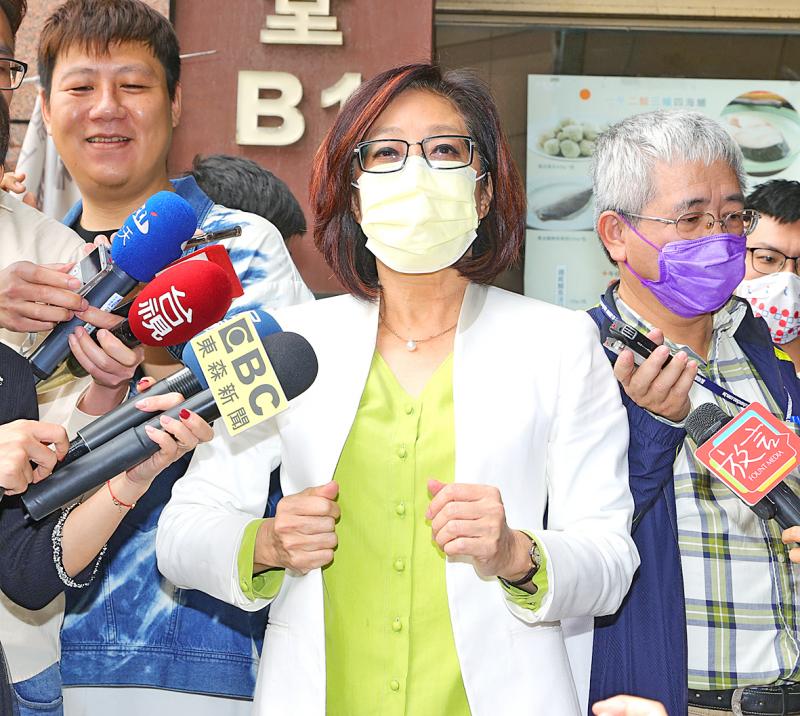The Democratic Progressive Party (DPP) yesterday suspended the memberships of three lawmakers who bucked the party line by abstaining from a floor vote on allowing imports of pork containing traces of ractopamine in December last year.
The DPP Central Review Committee imposed one-year membership suspensions on Lin Shu-fen (林淑芬), Chiang Yung-chang (江永昌) and Liu Chien-kuo (劉建國), and fined them NT$30,000 each.
If any of the three again defies orders to vote along the party line, they would be suspended for another three years, which would disqualify them from party primaries for the duration of the suspension.

Photo: CNA
The ruling, which is final and takes immediate effect, passed by a committee vote of five to three.
When asked about the decision, Chiang said that effectively regulated food imports would be safe, and although he agrees that Taiwan needs to open up its trade with the US, the government is rushing the public into accepting its policies when more patience is needed.
Party discipline is necessary, he said, adding that he accepts the review committee’s ruling.
As of press time last night, Lin and Liu had not responded to requests for comment.
Liu, who represents Yunlin’s second electoral district, is expected to run for county commissioner next year.
Committee chairwoman Kang Yu-cheng (康裕成) said that she “does not know” when the DPP is supposed to nominate a candidate for Yunlin County commissioner and that the committee’s only concern was selecting a fair suspension period.
While several committee members previously demurred to punish the lawmakers on procedural grounds, the party’s legislative caucus has addressed those concerns with a brief, which convinced the committee that it had the standing to move forward with a vote, she said.
A party member present at the proceedings said on the condition of anonymity that the committee had the option of suspending their memberships by one to three years.
Committee member Hsu Chao-shing (許昭興) proposed to give the lawmakers a formal warning; Lin Bao-hsing (林寶興) proposed a six-month suspension; Lin I-chin (林宜瑾) proposed a one-year suspension with conditions; Chang Chih-hao (張志豪) proposed a one-year suspension with no conditions; and Chen Kun-jung (陳坤榮) proposed a one-year-suspension and removal from the party upon a second infraction, the party member said.
Chang Chih-hao said he agreed with the committee that the lawmakers be given a chance to improve.
Liu’s political hopes in Yunlin hinge on the party appointing a candidate for the Yunlin Commissioner election, a party source said on the condition of anonymity.
His eligibility to appear on the ballot of a primary election would be irrelevant if the party appoints him as the uncontested nominee, the source said.
However, if the party nominates a candidate through a contested primary, the timing of the election would decide Lin Shu-fen’s political future, as his membership — and therefore his eligibility to take part in primaries — will not be restored until March next year, the source said.
Another party insider, also commenting on the condition of anonymity, said that an extended three-year suspension would be catastrophic for the lawmakers, as they would be unable to appear on the DPP ballot for their re-elections.

A preclearance service to facilitate entry for people traveling to select airports in Japan would be available from Thursday next week to Feb. 25 at Taiwan Taoyuan International Airport, Taoyuan International Airport Corp (TIAC) said on Tuesday. The service was first made available to Taiwanese travelers throughout the winter vacation of 2024 and during the Lunar New Year holiday. In addition to flights to the Japanese cities of Hakodate, Asahikawa, Akita, Sendai, Niigata, Okayama, Takamatsu, Kumamoto and Kagoshima, the service would be available to travelers to Kobe and Oita. The service can be accessed by passengers of 15 flight routes operated by

MORE FALL: An investigation into one of Xi’s key cronies, part of a broader ‘anti-corruption’ drive, indicates that he might have a deep distrust in the military, an expert said China’s latest military purge underscores systemic risks in its shift from collective leadership to sole rule under Chinese President Xi Jinping (習近平), and could disrupt its chain of command and military capabilities, a national security official said yesterday. If decisionmaking within the Chinese Communist Party has become “irrational” under one-man rule, the Taiwan Strait and the regional situation must be approached with extreme caution, given unforeseen risks, they added. The anonymous official made the remarks as China’s Central Military Commission Vice Chairman Zhang Youxia (張又俠) and Joint Staff Department Chief of Staff Liu Zhenli (劉振立) were reportedly being investigated for suspected “serious

ENHANCING EFFICIENCY: The apron can accommodate 16 airplanes overnight at Taoyuan airport while work on the third runway continues, the transport minister said A new temporary overnight parking apron at Taiwan Taoyuan International Airport is to start operating on Friday next week to boost operational efficiency while the third runway is being constructed, the Ministry of Transportation and Communications said yesterday. The apron — one of the crucial projects in the construction of the third runway — can accommodate 16 aircraft overnight at the nation’s largest international airport, Minister of Transportation and Communications Chen Shih-kai (陳世凱) told reporters while inspecting the new facility yesterday morning. Aside from providing the airport operator with greater flexibility in aircraft parking during the third runway construction,

Taiwanese and US defense groups are collaborating to introduce deployable, semi-autonomous manufacturing systems for drones and components in a boost to the nation’s supply chain resilience. Taiwan’s G-Tech Optroelectronics Corp subsidiary GTOC and the US’ Aerkomm Inc on Friday announced an agreement with fellow US-based Firestorm Lab to adopt the latter’s xCell, a technology featuring 3D printers fitted in 6.1m container units. The systems enable aerial platforms and parts to be produced in high volumes from dispersed nodes capable of rapid redeployment, to minimize the risk of enemy strikes and to meet field requirements, they said. Firestorm chief technology officer Ian Muceus said